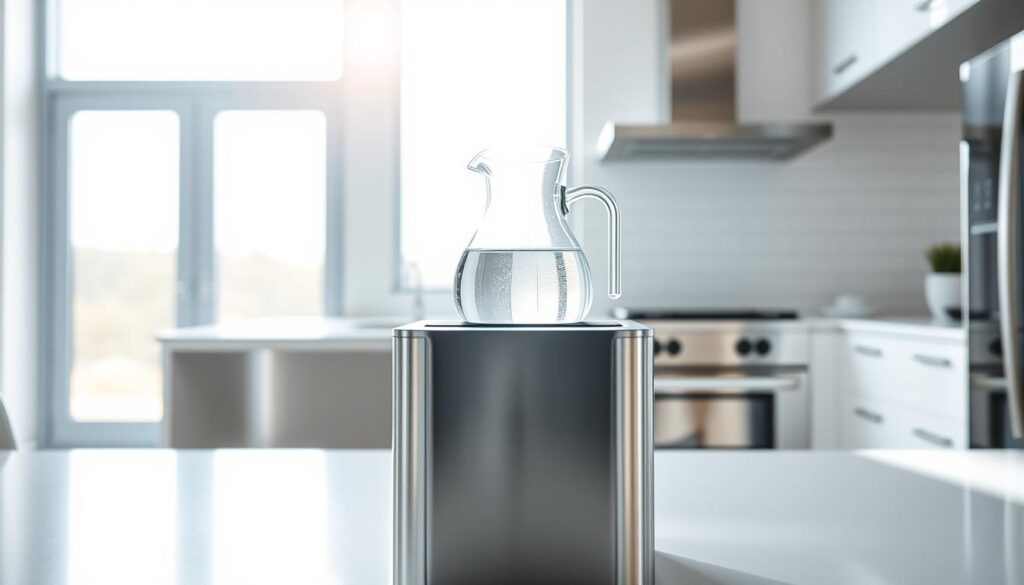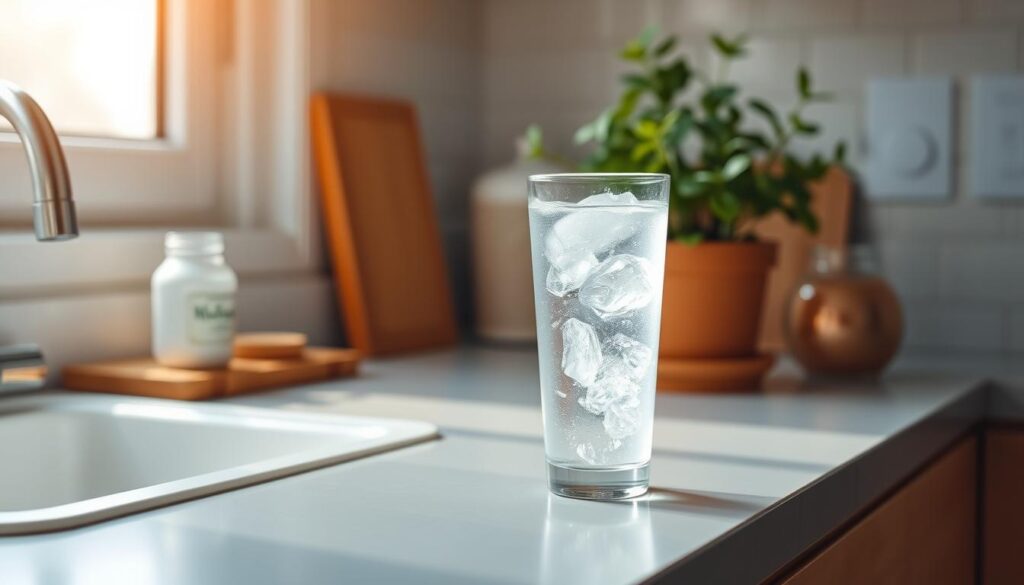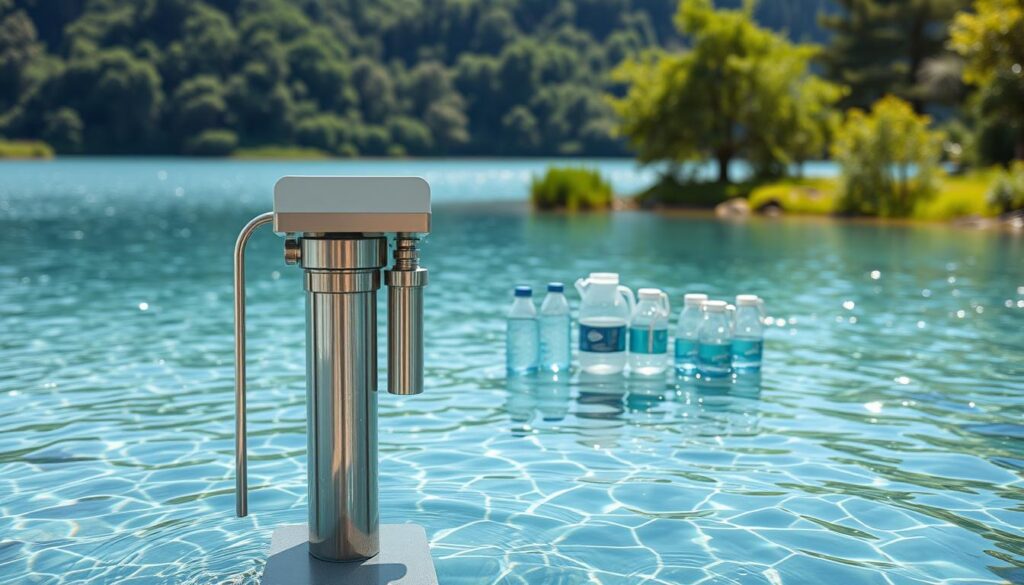I’ve always been worried about the quality of drinking water. That’s why I think it’s key to have a good purification system at home. With so many choices, picking the right one can feel like a big task.
So, I’ve put together a guide on picking the best UV water purifiers. In this article, I’ll show you what to look for. I’ll also explain why using this technology is great for keeping safe drinking water for you and your family.
Key Takeaways
- Understand the importance of UV water purification for safe drinking water
- Learn about the different types of UV water purifiers available
- Discover the key factors to consider when choosing a UV water purifier
- Find out how to ensure the effectiveness of your water purification system
- Explore the benefits of using UV technology for water purification
Understanding UV Water Purification
It’s important to know how UV water purification works to keep our water safe. This technology uses ultraviolet light to clean water, making it safe to drink.
What is UV Water Purification?
UV water purification kills bacteria, viruses, and other harmful microorganisms in water. It’s effective against a wide range of pathogens. This makes it a reliable way to ensure water is safe for drinking.
The process is simple. Water flows through a chamber where it meets UV light. This light disinfects the water, making it safe to drink.
How Does UV Technology Work?
UV technology emits light that kills microorganisms. When these organisms meet UV light, their DNA gets damaged. This stops them from reproducing and makes them harmless.
The success of UV water purification depends on the UV light’s intensity and how long the water is exposed. A good UV disinfection system makes sure water gets the right amount of UV light.
Benefits of Using UV Purifiers
UV purifiers are great because they kill many pathogens without chemicals. This makes UV water treatment an eco-friendly and chemical-free solution for water purification.
UV purifiers also need little maintenance. They don’t change the taste or smell of water. This makes them a good choice for many homes.
- Effective against a wide range of pathogens
- Chemical-free and eco-friendly
- Low maintenance requirements
Key Features to Look For
It’s important to know what makes a UV water purifier good. When picking one, look at several key things. These can really change how well it works and how happy you’ll be with it.
UV Lamp Quality
The UV lamp’s quality is key. A good UV lamp makes sure your water is clean. Choose a purifier with high-intensity UV lamps that last a long time. The lamp’s quality is what kills bacteria and viruses.
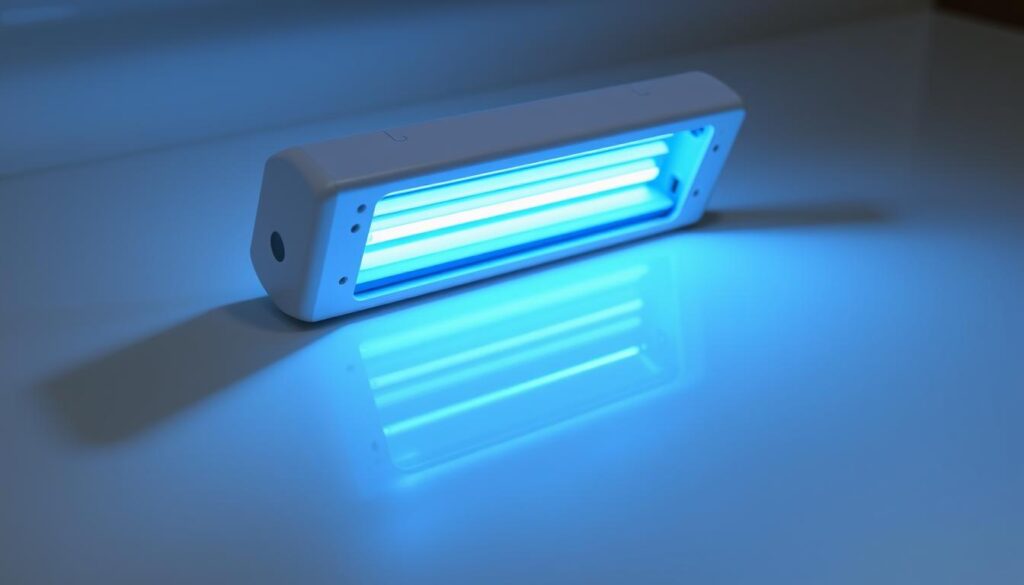
Flow Rate Considerations
The flow rate is another big deal. It shows how much water the purifier can handle at once. If you have a big family or work in a big place, you need a higher flow rate. But if you live alone or with just a few people, a lower flow rate might be enough.
Maintenance Requirements
Keeping your UV water purifier in top shape is important. Think about how often you’ll need to replace the UV lamp and how to clean the system. Some purifiers have automatic alert systems for when it’s time for maintenance. This can be really helpful.
Sensor and Safety Features
Safety is a big deal when it comes to UV water purifiers. Look for ones with UV intensity sensors and alarms. These features make sure your water is always safe to drink.
By looking at these key features, you can find the best UV water purifier for you. Whether you need one for your home or for well water, these tips will help.
Types of UV Water Purifiers
The market has many UV water purifiers for different needs. It’s key to know the types to choose wisely.
Point-of-Use vs. Point-of-Entry
UV water purifiers fall into two main types: point-of-use (POU) and point-of-entry (POE). Point-of-use systems are for a single tap, like a kitchen sink. They’re great for families who want clean water at one tap. Point-of-entry systems are for the main water line. They purify all water in the home.
| Type | Installation Point | Application |
|---|---|---|
| Point-of-Use | Single water outlet (e.g., kitchen sink) | Ideal for specific tap purification |
| Point-of-Entry | Main water line entering the house | Treating all water coming into the home |
Portable UV Purifiers
Portable UV purifiers are for easy use on the go. They’re great for travelers, campers, or emergency kits. These devices are small and battery-powered, making them versatile.
UV Systems for Whole House
Whole-house UV systems treat all home water, giving full protection. They’re installed at the main water line. They’re best for big homes or those with well water.
Choosing a UV water purifier depends on your household size and needs. Whether it’s for a single tap, the whole house, or portable use, pick what fits your water quality and convenience needs.
Assessing Your Water Quality
Checking your water quality is key to picking the right UV water purifier. Knowing what’s in your water helps choose a good UV disinfection system.
Common Contaminants in Water
Water can have many harmful things in it, like bacteria and viruses. Some common ones are:
- E. coli and other coliform bacteria
- Viruses such as Rotavirus and Norovirus
- Chemical contaminants like lead and pesticides
- Heavy metals such as mercury and arsenic
For more info on water contaminants, check this resource on water quality assessment.
Testing Your Water at Home
Testing your water at home is easy. You can use DIY kits or send a sample to a lab. Key things to test are:
- pH levels
- Bacterial contamination
- Presence of heavy metals
For a detailed guide on testing your water, see this guide to finding safe drinking.
How UV Purifiers Address Contaminants
UV water treatment is great against many contaminants. UV purifiers use ultraviolet light to kill pathogens by damaging their DNA.
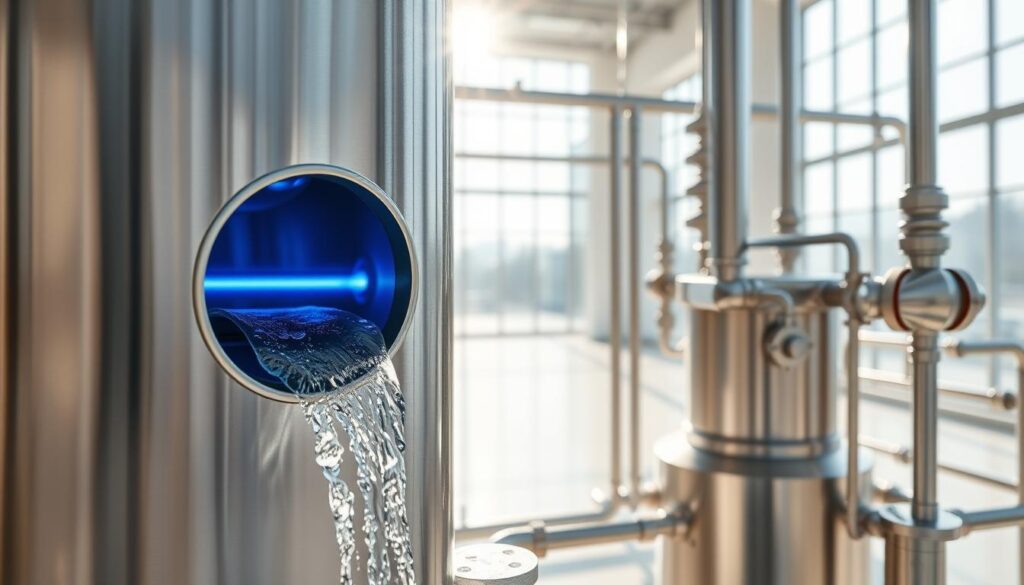
Understanding your water’s contaminants and how UV purifiers work helps you choose the right UV water purifier.
Energy Efficiency of UV Purifiers
UV purifiers are great for saving energy and being kind to the planet. As we all try to live greener, it’s key to know how UV water purifiers help. They save energy and reduce harm to our environment.
Power Consumption of Different Models
UV water purifiers use different amounts of power. This depends on their design, size, and tech. Most UV purifiers use less power than other ways to clean water. They might use 5 to 20 watts, depending on their size and how fast they work.
Efficient models use even less energy while keeping water clean. When looking at different models, check how much power they use. This helps make sure they meet your energy-saving goals.
Eco-Friendly Benefits of UV Technology
UV technology is good for the planet. It doesn’t make harmful waste like some other methods do. It also kills germs without using up filters, which saves resources over time.
“UV purification is a chemical-free process that doesn’t add any contaminants to the water, making it a highly eco-friendly option for water treatment.”
UV lamps last a long time, from 9 to 12 months, depending on use. This makes UV purifiers even greener by cutting down on waste from frequent replacements.
Choosing an energy-saving UV water purifier means you get clean water. Plus, you’re helping the planet.
Installation Options
Understanding the installation options for UV water purifiers helped me make a better choice. When picking a UV water purifier for your home, think about how it will be set up.
DIY Installation vs. Professional Setup
Deciding between DIY installation and a professional setup is key. DIY can save money and is easy for some models, like those for single faucets. But, a pro install makes sure it works right and lasts longer.
Some UV purifiers are easy for DIY fans, with clear guides and simple tools needed. Yet, big systems for the whole house might need a pro because of plumbing and wiring.
Space Considerations for Installation
Space is also a big deal. UV purifiers come in different sizes, so pick one that fits your space. For example, under-sink models work great in small kitchens, while whole-house systems need more room.
Before buying, measure where you’ll put the purifier. Think about its size and any extra space for upkeep, like changing the UV lamp. 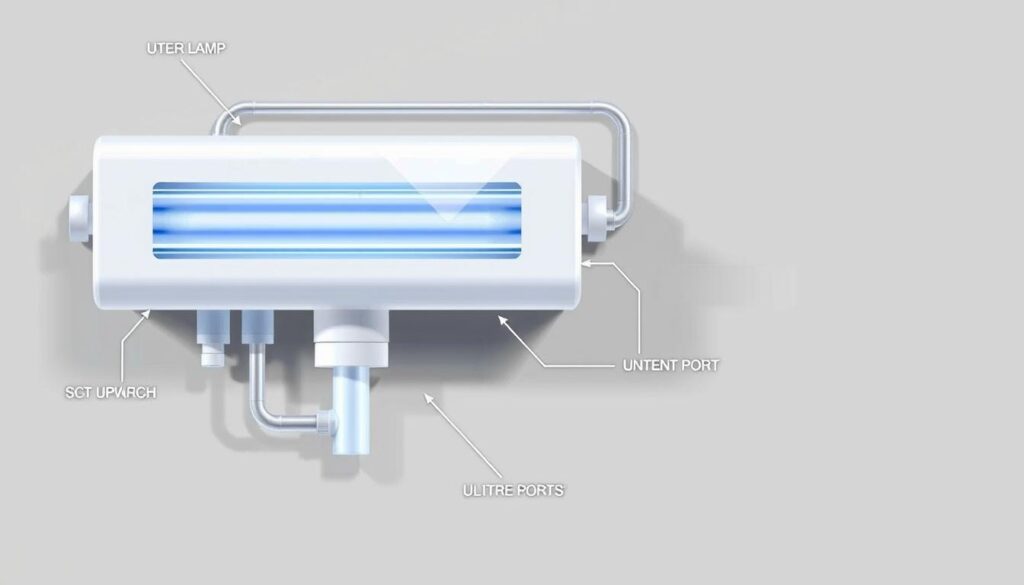
By looking at your options and space needs, you can find a UV purifier that fits your life and keeps your water safe and clean.
Maintenance and Care
Keeping your UV water purifier in good shape is key to clean drinking water. Its long life and effectiveness depend on regular care. Here, I’ll cover the upkeep tasks and when your UV purifier might need some extra attention.
Regular Maintenance Tasks
To keep your UV water filter working well, follow these steps:
- Replace the UV lamp every year or as the maker suggests.
- Clean the quartz sleeve around the UV lamp to remove dirt or buildup.
- Look for any wear or damage on the system.
- Check and swap out any old seals or O-rings.
Regular upkeep keeps your UV purifier working right and lasts longer. Always follow the maker’s maintenance advice to keep the warranty valid.
Signs Your UV Purifier Needs Attention
Knowing when your UV purifier needs some TLC is important. Look out for these signs:
- A drop in water flow rate.
- Water that’s cloudier or tastes/ smells different.
- Any error messages or alarms on the control panel.
- Visible damage or wear on the unit.
Ignoring these signs can harm your purifier’s performance and let bad stuff through. Regular checks and quick fixes keep your water safe and clean.
UV Water Purifier Costs
Buying a UV water purifier means understanding both the upfront and ongoing costs. The price can change a lot, depending on the brand, model, and features.
Average Price Range for Models
UV water purifiers can cost anywhere from $50 for simple, portable ones to over $500 for advanced, whole-house systems. Here’s a quick look at what you might pay for different types:
| Type of UV Purifier | Average Price Range |
|---|---|
| Basic Portable Models | $50-$150 |
| Advanced Portable Models | $150-$300 |
| Whole-House Systems | $300-$600 |
Cost vs. Long-Term Benefits
The upfront cost of a UV water purifier might seem high. But, think about the long-term gains. These systems give you clean drinking water and cut down on bottled water costs. They also remove harmful contaminants, which can save you money on health issues.
Long-term benefits include:
- Less money spent on bottled water
- Health cost savings by avoiding waterborne illnesses
- Longer life for your plumbing and appliances by removing contaminants
When you compare costs to benefits, getting a UV water purifier is a smart choice. As I look into the top UV water purifiers, it’s important to remember these points for a well-informed decision.
Popular UV Water Purifier Brands
Several brands are leaders in UV water purification. They focus on quality, innovation, and making customers happy. It’s important to look at the brand’s reputation when picking a UV water purifier.
Leading Brands to Consider
SteriPen is known for easy-to-use, portable designs. Aquasana offers systems that use UV and other filters together.
Hydro-Photon makes high-quality UV purifiers for homes and businesses. Pur is respected for its affordable, effective UV water systems.
Customer Reviews and Ratings
Customer feedback is key to understanding UV water purifier performance. SteriPen is loved for its simplicity and effectiveness outdoors.
Aquasana is praised for its all-in-one water purification. It uses UV light, activated carbon, and more to clean water.
| Brand | Model | Customer Rating | Key Features |
|---|---|---|---|
| SteriPen | SteriPen Ultra | 4.5/5 | Portable, UV technology, battery-powered |
| Aquasana | Aquasana UV | 4.7/5 | Multi-stage filtration, UV light, salt-free |
| Hydro-Photon | Hydro-Photon UV Purifier | 4.8/5 | High-capacity, durable, easy maintenance |
Looking at customer reviews and ratings helps make better choices. It’s about understanding the features and benefits of each brand.
How to Compare Different Models
To choose the right UV water purifier, it’s key to compare different models. Several important factors need to be considered.
Key Specifications to Compare
When looking at UV water purifiers, focus on a few key specs. These include the UV lamp quality, flow rate, and maintenance requirements.
- UV Lamp Quality: A top-notch UV lamp is vital for killing bacteria. Look for lamps that last long and work well.
- Flow Rate: The flow rate shows how much water the purifier can handle. Pick a model that fits your home’s needs.
- Maintenance Requirements: Some purifiers need more care than others. Choose models with easy lamp changes and simple upkeep.
Making a Side-by-Side Comparison
Creating a side-by-side comparison helps see the differences between models. Here’s an example table:
| Model | UV Lamp Life | Flow Rate (L/min) | Maintenance Frequency |
|---|---|---|---|
| Model A | 9000 hours | 10 | Every 6 months |
| Model B | 12000 hours | 15 | Every 12 months |
By comparing these specs, you can pick the UV water purifier that’s best for you.
Warranty and Customer Support
When you buy a UV water purifier, think about the warranty and customer support. A good warranty and support can give you peace of mind and protect your investment.
Importance of Warranty Coverage
A solid warranty is key for any product, like a UV water purifier. It covers repairs and replacements and shows the manufacturer’s confidence. Look at the warranty’s length, what it covers, and any conditions that might void it.
Key aspects to consider in a warranty include:
- Duration: How long does the warranty last?
- Coverage: What parts and components are covered under the warranty?
- Conditions: Are there any specific conditions or maintenance requirements that need to be met to keep the warranty valid?
Evaluating Customer Service Quality
Customer service is also important when picking a UV water purifier. Good service can greatly improve your experience, even if you run into problems. Look for manufacturers with various support options like phone, email, and chat. Also, check what others say about their service.
Some indicators of good customer service include:
- Multiple support channels
- Responsive and helpful customer support staff
- Comprehensive FAQs and troubleshooting guides on the manufacturer’s website
In summary, a good warranty and reliable customer support are essential when choosing a UV water purifier. By looking into these areas, you can have a better experience with your UV water purifier.
Final Thoughts on Choosing a UV Water Purifier
Choosing the right UV water purifier is important. We’ve looked at how UV technology works and what you need for your water. This guide helps you make a smart choice.
Key Takeaways
UV water purifiers are great for removing harmful stuff from your water. Look at the UV lamp quality, flow rate, and how easy it is to maintain. Also, check your water quality and the types of UV purifiers out there.
Making the Right Choice
Think about the pros and cons of different UV water purifiers. This will help you pick one that fits your needs and gives you clean water. Don’t forget to check the warranty, customer support, cost, and long-term benefits.
By making a smart choice, you’ll enjoy clean drinking water for years. This brings you peace of mind and clean water.
FAQ
What is a UV water purifier, and how does it work?
A UV water purifier uses ultraviolet light to kill harmful microorganisms in water. This makes the water safe to drink. It works by exposing the water to UV light, which damages the DNA of bacteria, viruses, and parasites, making them harmless.
Are UV water purifiers effective against all types of contaminants?
UV water purifiers are good at killing bacteria, viruses, and parasites. But, they don’t remove heavy metals, chemicals, or particles. So, you might need extra filters for these.
How often do I need to replace the UV lamp in my UV water purifier?
You should replace the UV lamp every 9 to 12 months, as the maker suggests. Keeping it up is key to its effectiveness.
Can I install a UV water purifier myself, or do I need a professional?
Some UV water purifiers are easy to install yourself. Others need a pro. Always follow the maker’s guide and think about plumbing and electrical needs.
How do I know if my UV water purifier is working correctly?
Many UV purifiers have sensors and alarms for issues. Regular checks and maintenance help ensure it works right.
Are UV water purifiers energy-efficient?
Yes, UV water purifiers are energy-efficient. They use 10-20 watts of power. But, power use can change based on the model and how often you use it.
Can I use a UV water purifier with well water?
Yes, UV purifiers work well with well water. They’re great for killing bacteria, viruses, and parasites in well water.
What is the average cost of a UV water purifier?
The cost of a UV water purifier varies a lot. Prices range from a few hundred to several thousand dollars, depending on the model and brand.
Do UV water purifiers require regular maintenance?
Yes, UV purifiers need regular care. This includes replacing the UV lamp, cleaning the quartz sleeve, and checking for blockages or issues.
How do I choose the right UV water purifier for my needs?
To pick the right UV purifier, think about your water quality, flow rate, and maintenance needs. Look at different models, read reviews, and talk to experts to make a good choice.

